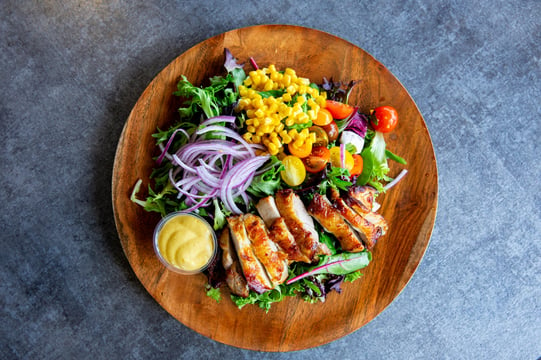What is a Balanced Diet?
A balanced diet is more than just eating the right number of calories; it is about nourishing your body with the essential nutrients required to function optimally. In today's fast-paced world, where processed foods and quick meals are the norm, maintaining a balanced diet can be challenging. However, the benefits of proper nutrition go beyond just weight management – it significantly impacts both internal health and external appearance. In this blog, we will explore what constitutes a balanced diet, its key components, what to eat, and how it contributes to both internal well-being and external growth.
3/14/20252 min read


A balanced diet includes a variety of foods that provide essential macronutrients (carbohydrates, proteins, and fats) and micronutrients (vitamins and minerals). It ensures that the body gets all the nutrients it needs to function efficiently without an excess or deficiency of any particular component.
Key Components of a Balanced Diet:
Carbohydrates: The primary source of energy for the body. Found in whole grains, fruits, vegetables, and legumes.
Proteins: Essential for muscle repair, immune function, and enzyme production. Found in lean meats, fish, dairy, legumes, nuts, and seeds.
Fats: Required for brain function, hormone production, and cell growth. Healthy fats come from sources like olive oil, avocados, nuts, and fatty fish.
Vitamins and Minerals: These support various bodily functions, from bone health to immune defense. Found in fruits, vegetables, dairy, and nuts.
Water: Crucial for hydration, digestion, and overall cellular function.
Fiber: Aids digestion, promotes gut health, and prevents constipation. Found in whole grains, fruits, vegetables, and legumes.
A well-rounded diet includes a mix of these elements in appropriate portions, avoiding excessive processed foods, added sugars, and unhealthy fats.
What to Eat for a Balanced Diet ?
To maintain a well-balanced diet, it is essential to consume a variety of nutrient-rich foods daily. Here’s what your plate should typically include:
1. Carbohydrates (50-60% of daily intake)
Whole grains: Brown rice, quinoa, oats, whole wheat bread, barley
Fruits: Apples, bananas, oranges, berries, pears
Vegetables: Sweet potatoes, carrots, spinach, kale, bell peppers
Legumes: Lentils, chickpeas, black beans, kidney beans
2. Proteins (15-25% of daily intake)
Lean meats: Chicken breast, turkey, lean cuts of beef
Fish: Salmon, tuna, mackerel, sardines
Plant-based proteins: Tofu, tempeh, lentils, beans
Dairy: Greek yogurt, cottage cheese, milk
Nuts and seeds: Almonds, walnuts, chia seeds, flaxseeds
3. Healthy Fats (20-30% of daily intake)
Olive oil, coconut oil, avocado oil
Fatty fish like salmon and trout
Nuts and seeds: Almonds, walnuts, sunflower seeds
Avocados
Dark chocolate (in moderation)
4. Vitamins and Minerals
Vitamin C: Citrus fruits, bell peppers, strawberries
Vitamin A: Carrots, sweet potatoes, spinach
Calcium: Dairy products, fortified plant milk, kale
Iron: Red meat, spinach, lentils
Zinc: Nuts, seeds, seafood
Magnesium: Dark leafy greens, nuts, whole grains
5. Hydration
Water: Aim for at least 8 glasses a day
Herbal teas and coconut water as alternatives
Fresh fruit-infused water for variety
6. Foods to Limit
Processed foods high in sugar and unhealthy fats
Sugary beverages such as sodas and artificial juices
Fast food and deep-fried items
Excessive red and processed meats
⚠ Processed foods, sugary drinks, fast food, excessive red meat, and deep-fried items. Incorporating these elements into your daily meals ensures a healthier, more energetic life. Small, mindful choices can lead to lasting well-being!
